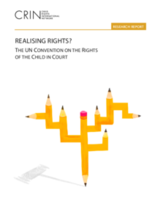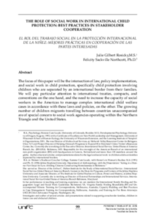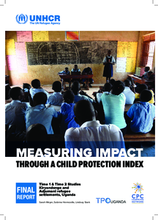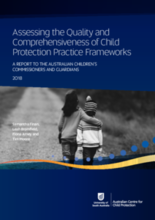Displaying 631 - 640 of 1759
The aim of this article is to analyse juridification and standardisation as two legal dimensions influencing contemporary child-protection work, and to discuss its implications for practice.
Providing relative caregivers the same financial benefits and supports as nonrelative foster caregivers is the focus of ongoing US federal litigation described in this article from the Child Law Practice Today July/August 2017 Issue on Kinship Care. The litigation addresses the equitable treatment of relatives who care for children in the child welfare system.
This paper focuses on understanding how the key stakeholders of the foster care system work together, as well as the systems that facilitate collaboration.
A First Nations child welfare organization has prioritized further understanding of reunification and parenting, including identification of successes and barriers to reunification, and service needs within communities. These priorities were addressed with a community-based participatory research model and guided by a Research Advisory.
This article outlines exploratory research in establishing a role for social work in child protection in Indonesia.
This report by the Child Rights International Network (CRIN) draws out the ways the Convention on the Rights of the Child (CRC) has been used around the world to challenge abuses of children’s rights, but also where it has been misunderstood and misapplied by national courts.
The focus of this paper will be the intersection of law, policy implementation, and social work in child protection, specifically child protection involving children who are separated by an international border from their families.
‘Prepare for Leaving Care – A Child Protection System that Works for Professionals and Young People’, a two-year project co-funded by the Rights, Equality and Citizenship (REC) Programme of the European Union (2017-2018), aims to ensure that the rights of young people in alternative care are respected and that they are prepared for an independent life.
This report describes the research conducted in 2016 in Kiryandongo and Adjumani refugee settlements in Uganda, presenting a comparison of child protection system strength between 2014/5 and 2016, and child protection outcomes over the same time period.
This report, developed by the Australian Centre for Child Protection (ACCP) in consulation with an Expert Panel, provides an analysis and evaluation of a range of child protection practice frameworks in terms of the way they respond to the values and principles and approach to working with children and families applicable to the continuum of child protection practice.




